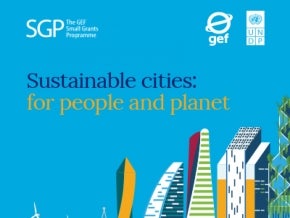The meeting has provided training and guidance on the vision and strategy of the programme, advanced SGP’s results-based management framework, as well as promoted the GEF’s visibility policy across the region. The event was hosted at the Outrigger Hotel in Sigatoka, Fiji, from 27 February to 2 March, 2012.
National Coordinators, Sub-Regional Coordinators, and National Focal Points of the GEF SGP (from Fiji, Tuvalu, Nauru, Samoa, Kiribati, Federated States of Micronesia, Solomon Islands, Papua New Guinea, and Vanuatu), GEF Secretariat, national partners, and representatives of UN agencies, met to discuss the success of projects funded and the programme’s core objectives for OP5 (2011- 2014). The meeting discussed SGP implementation arrangements and shared lessons on community-based approaches to biodiversity conservation, climate change mitigation, land degradation, international waters and chemicals.

GEF SGP in the Fiji sub-region hosted the workshop and provided participants the opportunity to see the results of the programme on the ground and learn from its experience. The GEF SGP for Fiji started in 2004 and has supported 89 community-based projects for the sub-region delivering US$2.85 million in grants. In addition, the SGP in the Pacific has raised US$3 million in co-financing from NZAID, as well as $4 million from AusAID for Community-Based Adaptation (CBA) to climate change for Pacific Island Countries (PICs).
The workshop opened on Monday 27 February with opening statements by Mr. Delfin Ganapin, Global Manager, GEF Small Grants Programme; Mr. Danielius Pivoriunas, Senior Operations Officer, Global Environment Facility; Ms. Asenaca Ravuvu, UNDP Fiji Multi Country Office; as well as welcoming remarks by Mr. Jope Davetanivalu, GEF Operational Focal Point of the Government of Fiji.
The GEF SGP Global Manager, Delfin Ganapin said: “This meeting has provided an opportunity to share good practices on community-based approaches to biodiversity conservation, climate change mitigation and adaptation and preventing land degradation in the Pacific Region. There are some very good examples of community-led environmental protection programmes with funding provided by the GEF and other important regional donors including both NZAID and AusAID.”
UNDP Fiji Multi Country Office’s Assistant Resident Representative, Asenaca Ravuvu, delivered opening remarks on behalf of the UN Resident Coordinator and UNDP Resident Representative, Knut Ostby, noting: “The relevance of SGP to the Pacific is indisputable. More than 75% of population in this region reside in rural areas, including isolated outer islands and have always depended very closely on their natural resources for livelihood and well-being…. This [dependence] is compounded by impacts of climate change, overharvesting of natural resources, and proliferation of invasive species, high population growth, the global financial crisis, natural disasters and unsustainable development.”
Participants visited a sustainable forestry management project in Biausevu Village to see a community-led environmental management project in practice. The workshop also included a ‘market place event’ where SGP Fiji grantees and partners showcased impacts and results of SGP projects in their various communities. This included work implemented by Bird Life Fiji and Site Support Groups (SSGs) in the Natewa Peninsula; advocacy work on turtle conservation by the Mamanuca Environment Society; as well as climate change resilience and resource management activities led by Island Development Committees and WWF in the Lau Group. Today, the GEF SGP Fiji national programme is considered one of most successful country programs in the region.
Background for editors
About the GEF
The Global Environment Facility (GEF) unites 182 countries in partnership with international institutions, civil society organizations (CSOs), and the private sector to address global environmental issues while supporting national sustainable development initiatives. Today the GEF is the largest public funder of projects to improve the global environment. An independently operating financial organization, the GEF provides grants for projects related to biodiversity, climate change, international waters, land degradation, the ozone layer, and persistent organic pollutants.
Since 1991, GEF has achieved a strong track record with developing countries and countries with economies in transition, providing $10 billion in grants and leveraging $47 billion in co-financing for over 2,800 projects in over 168 countries. Through its Small Grants Programme (SGP), the GEF has also made more than 13,000 small grants directly to civil society and community based organizations, totaling $634 million. For more information, visit www.thegef.org.
Media contacts:
Ana Maria Currea,
Knowledge Management Facilitator,
GEF SGP.212-906-6028
Mr. John Diamond
Senior Communication Officer | Spokesperson
Phone +1 202 458 7953
E-mail: jdiamond@thegef.org


